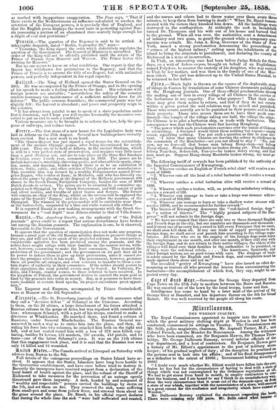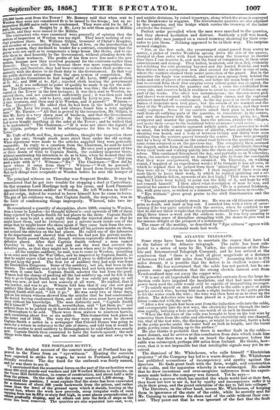alioullattutio.
THE WEEDON INQUIRY.
The Royal Commissioners appointed to inquire into the manner in which the great military clothing depot at Wooden is and has been conducted, commenced its sittings on Tuesday. The Commissioners ere Mr. Selfe, police magistrate, chairman Mr. Aspinall Turner M.P., and Colonel French, not the Member for ioscommon. Among the witnesses who have been examined, are Sir Benjamin Hawes, Sir Thomas Trois- bridge Mr. George Dalhousie Ramsay, several inferior officials of the war department, and a host of contractors. Sir Benjamin Hawes gave a history of Mr. Elliott's appointment to the post of military atom. keeper ; of his gradual neglect of duty; of the deception he practised on the persons sent to look into his affairs • and of his final disappeaTio, as a defaulter to the extent of 23001.; 'Government holding security a 2000/. "I doubt very much whether Mr. Elliott would have fallen into the con- fusion he has but for the circumstance of having to deal with a state of things which was not contemplated by the Ordnance regulations at all We had to get stores from hand to mouth, to employ contractors to con- duct the business, and I am bound to say I think in an unsatisfactory way, from the very circumstance that it arose out of the demands upon us from a state of war which, together with the nonexistence of a store, will account to a great extent for the confusion and irregularity which have existed at Weedon." Mr. Dalhousie Ramsay explained the statement respecting the boat There were missing only 162 pairs. Mr. Selfe asked what became 01 170,000 boots sent from the Tower? Mr. Ramsay said that when sent to weedon they were not considered fit to be issued to the troops; but on re- inspection 26,000 pairs only were condemned. They were sold for 5s. 5d. a haying cost 8s. Bought by a Mr. Levy he sold them again to Militia colobele, and they were issued to the Militia. The contractors who were examined were generally of opinion that the ertem of inspection at Weedon was too rigid. They knew nothing of cor- rupt practices there. Mr. William Gilpin, treasurer of Christ's Hospital, sna member of a contracting firm, said that at first, on the introduction of the new system, they declined to tender for a contract, considering that the prizes were not such as to compensate a large house like theirs, and to en- able them to deal honestly by the Government, without grinding down the wages of their workmen. The profits of his firm were less under the new system, because now they received payment for the contracts earlier than formerly. They were also less because there was more competition than heretofore, and therefore, they had been content to reduce their profits con- sistently with the desire to do their duty to the Government. In that way the public derived advantage from the open system of competition. Mr. Gilpin told the Committee he had bought of Mr. Levy, 8000 yards of cloth a as. 8(1., and 3800 at 48. 41d.; rejected cloth bearing the government mark. As it was sufficient in point of quality he made it up for the mili- tia. The Chairman.—" Then the transaction was this; the cloth was ac- cepted at the Tower in the first instance; it was then sent to Weedon in-
spected there and not considered sufficiently good • it was then sent b ' back
to the Tower for sale sold to Levy, and resold by Levy to you. You made it into trowsers, and then sent it to Weedon, and itpassed ? " Witness.— yes. (Laughter.) He added that he had been in the habit of buying goods of Mr. Levy for years, and had always found him a very upright man." Mr. Turner.—, • All that is proved by the transaction, Mr. Gilpin, is that Mr. Ley is a very sharp man of business, and that the Government are not very sharp." (Laughter.) By the Chairman.—" He (witness) had never bought anything at the sales at the Tower; and he wished that to be understood." The Chairman.—" If it were not above the dignity of Mr. Gilpin, perhaps it would be advantageous for him to buy at the Tower."
Mr. Cuffe of Cafe and Son, Army saddlers thought the inspection there was a fair one; though much more strict than under the old system. When objections were made to the articles supplied they were generally reasonable. In reply to a question from the Chairman, he said he knew nothing of any corrupt practices at Weedon. He once sent a present of two or three dozen of wine to Captain Smith, the saddlery inspector there, without mentioning his intention to do so to him, when he desired that the till might be sent, and afterwards paid for it. The Chairman—" Did you send a note with it"? Witness—"No." The Chairman—" How did he know where it came from then" ? Witness—" Well he guessed." (Laughter.) By Mr. Turner—" Witness had heard from Sergeant Brodie that such things were acceptable at Weedon before he sent the hamper of wine."
The principal witness on Thursday was Sergeant Brodie. It may be remembered that he got into trouble for stopping a duel at Canterbury. On that occasion Lord Hardinge took up his cause, and Lord Panmure appointed him foreman saddler at Weedon. He left Weedon in 1857— did not resign, indeed he wanted to know himself how he came to leave. The gist of his evidence was, that Captain Smith, the inspector, was in the habit of condemning things improperly. Whereof, take two in- stances—
He remembered a quantity of sheepskins, above 1000, coming to Weedon, from a house in London—he thought Gibson's—and upwards of 100 of them being rejected by Captain Smith for bad places in the skins. Captain Smith ordered a man to put a stick right through the rejected skins so that he might know them, and he (witness) put a private mark inside one of the straps that he might know the skins again if they came back from the con- tractors. The skins came back, and he found all his private marks on them, and noticed the stitches on the bad places. He called one of the labourers in the department and showed him where he had put his private marks. Captain Smith passed them all, though witness repeatedly showed him the defective places. After that Captain Smith ordered a man named Crutchley to take his awls and pick out the wool that covered the defective parts, so that they might not be seen when sent to the regiments.
• . . . All the surplus saddlery., he said was to come to Weedon, according to an order sent from the War Office, and be inspected by Captain Smith, so that he might reject what was bad and send it away to different places to be mold and keep the good. The first lot of saddlery they had sent was from the Enniskille n Dragoons. Some of the saddlery, not all, had been in the Crimea. The saddlery sent out to the Crimea had not been nine months in use when it came back. Captain Smith selected the bad from the pea. Witness had the charge of packing all the bad saddlery up, and he felt it his duty to go to Captain Smith and say that he was surely not going to sell what was new, or had not been scarcely at all worn. He replied, that it was lumber, and was to go. Witness told him that if any one saw good saddlery like that for sale they would be sure to complain of it being sold. Captain Smith still said, "Let it go." He was away two or three days, and OD his return witness showed him the articles that he had condemned. Be denied havino•' condemned them, and said the man must have put them away without his knowledge. The man distinctly said, "Captain Smith did it himself." Captain Smith i nevertheless, said "Let them go," and Ordered them to be packed up in barrels and directed to the barrack-master at Birmingham to be sold. There were from sixteen to nineteen barrels, each containing about five or six saddles. This transaction took place in the latter end of 1856. The very day they were going away he showed Captain Smith a notice in a newspaper that Colonel Dunne was going to move for a return in reference to the sale of stores, and told him it would be a serious matter to send saddlery to Birmingham to be sold which was nearly Raw. Captain Smith then consented to have the barrels opened; the new
things were then taken out, and the rest nailed up and sent away to be sold.



























 Previous page
Previous page